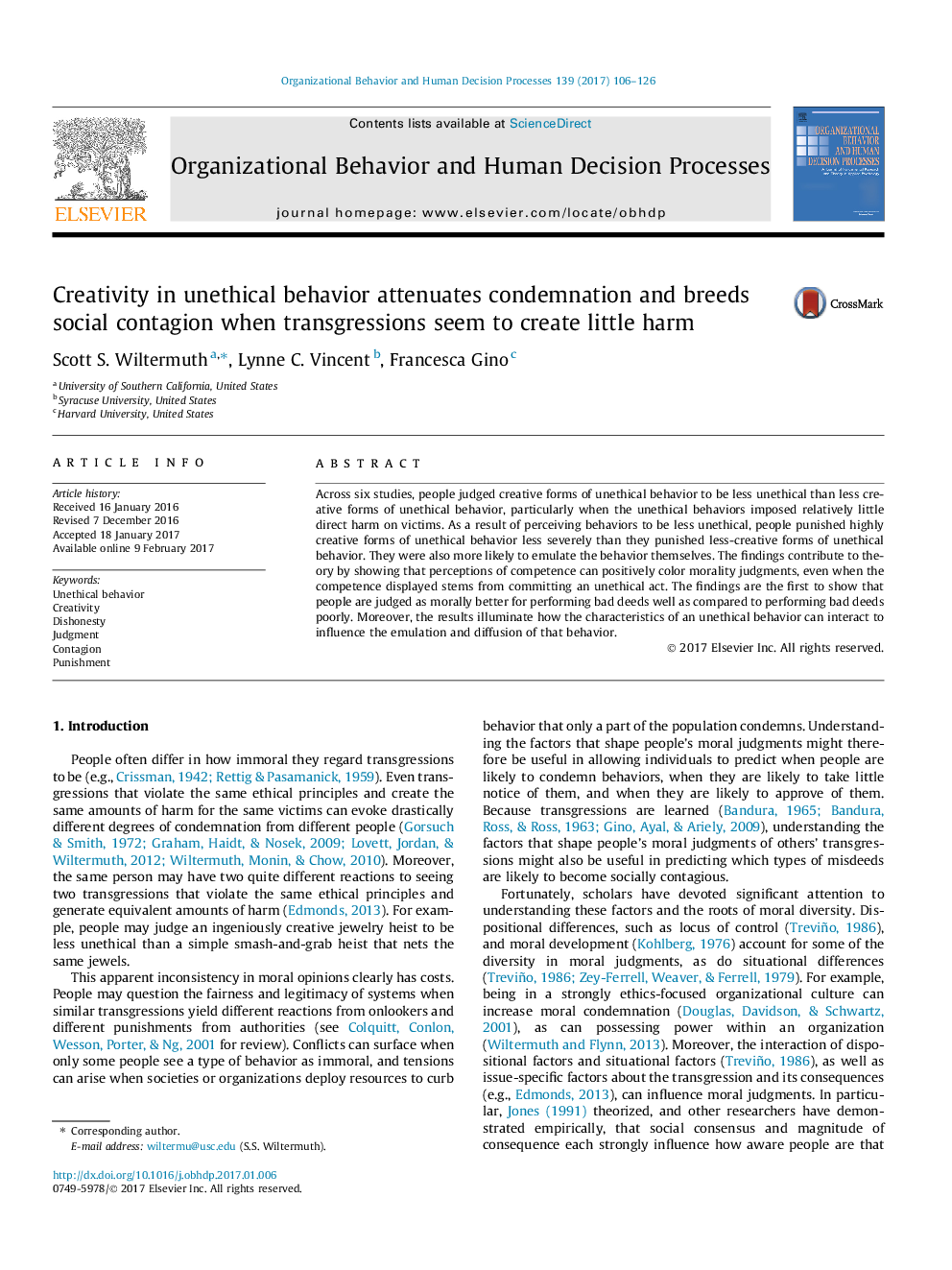| کد مقاله | کد نشریه | سال انتشار | مقاله انگلیسی | نسخه تمام متن |
|---|---|---|---|---|
| 5035348 | 1471842 | 2017 | 21 صفحه PDF | دانلود رایگان |
عنوان انگلیسی مقاله ISI
Creativity in unethical behavior attenuates condemnation and breeds social contagion when transgressions seem to create little harm
ترجمه فارسی عنوان
خلاقیت در رفتار غیر اخلاقی، محکومیت را کاهش می دهد و باعث می شود که انحرافات اجتماعی باعث ایجاد آسیب کمی شود
دانلود مقاله + سفارش ترجمه
دانلود مقاله ISI انگلیسی
رایگان برای ایرانیان
کلمات کلیدی
رفتار غیر اخلاقی، خلاقیت، ناسپاسی، داوری، آلودگی مجازات،
ترجمه چکیده
در شش مطالعات، افراد به شکل خلاق رفتارهای غیر اخلاقی به صورت غیر اخلاقی کمتر از اشکال خلاقانه رفتارهای غیر اخلاقی فکر می کردند، به ویژه هنگامی که رفتارهای غیر اخلاقی به طور مستقیم آسیب مستقیم به قربانیان اعمال می کردند. به عنوان یک نتیجه از درک رفتارهایی که کمتر غیر اخلاقی است، افراد مجازات بسیار خلاقانه رفتارهای غیر اخلاقی را کمتر از اینکه مجازات اشکال خلاقانهتری از رفتار غیر اخلاقی را مجازات می کنند. آنها بیشتر احتمال دارد که رفتار خود را تقلید کنند. یافته ها به تئوری کمک می کنند، نشان می دهد که ادراک های شایستگی می توانند داوری های اخلاقی رنگی مثبت را حتی در صورتی که صلاحیت نمایشی ناشی از ارتکاب اعمال غیر اخلاقی باشد، مثبت جلوه دهد. یافته ها اولین کسانی هستند که نشان می دهند که مردم به خوبی از نظر اخلاقی برای انجام اعمال بد به خوبی در مقایسه با انجام بد بد عمل می کنند. علاوه بر این، نتایج نشان می دهد که چگونه ویژگی های یک رفتار غیر اخلاقی می توانند در تعامل با همتایی و انتشار این رفتار تاثیر گذار باشند.
موضوعات مرتبط
علوم انسانی و اجتماعی
مدیریت، کسب و کار و حسابداری
بازاریابی و مدیریت بازار
چکیده انگلیسی
Across six studies, people judged creative forms of unethical behavior to be less unethical than less creative forms of unethical behavior, particularly when the unethical behaviors imposed relatively little direct harm on victims. As a result of perceiving behaviors to be less unethical, people punished highly creative forms of unethical behavior less severely than they punished less-creative forms of unethical behavior. They were also more likely to emulate the behavior themselves. The findings contribute to theory by showing that perceptions of competence can positively color morality judgments, even when the competence displayed stems from committing an unethical act. The findings are the first to show that people are judged as morally better for performing bad deeds well as compared to performing bad deeds poorly. Moreover, the results illuminate how the characteristics of an unethical behavior can interact to influence the emulation and diffusion of that behavior.
ناشر
Database: Elsevier - ScienceDirect (ساینس دایرکت)
Journal: Organizational Behavior and Human Decision Processes - Volume 139, March 2017, Pages 106-126
Journal: Organizational Behavior and Human Decision Processes - Volume 139, March 2017, Pages 106-126
نویسندگان
Scott S. Wiltermuth, Lynne C. Vincent, Francesca Gino,
